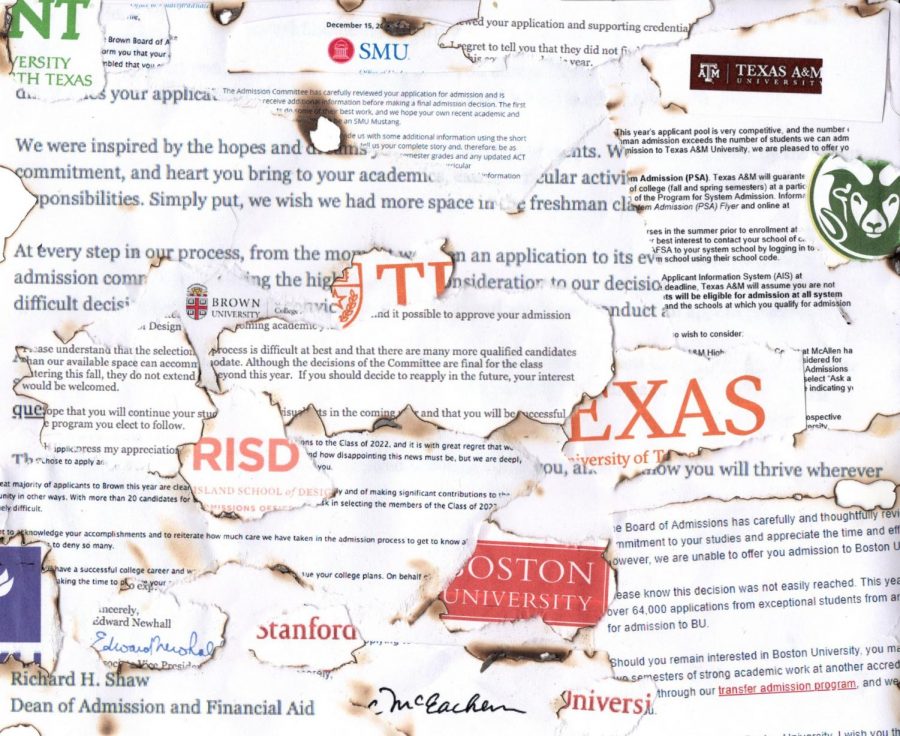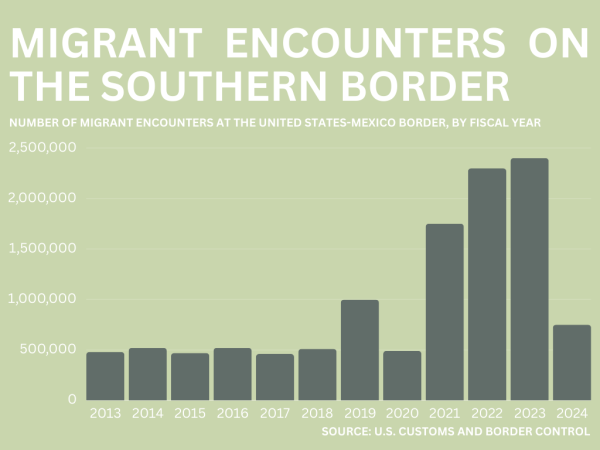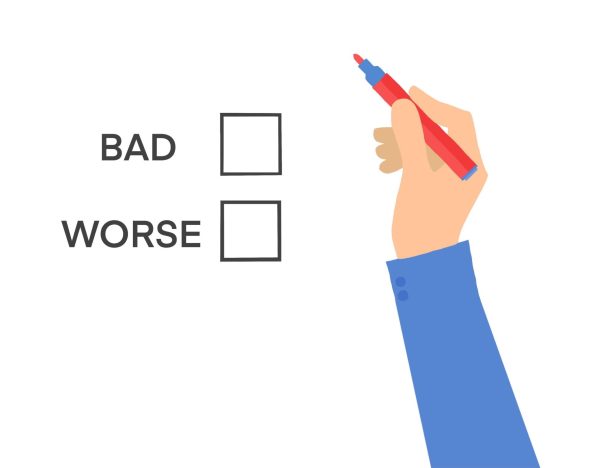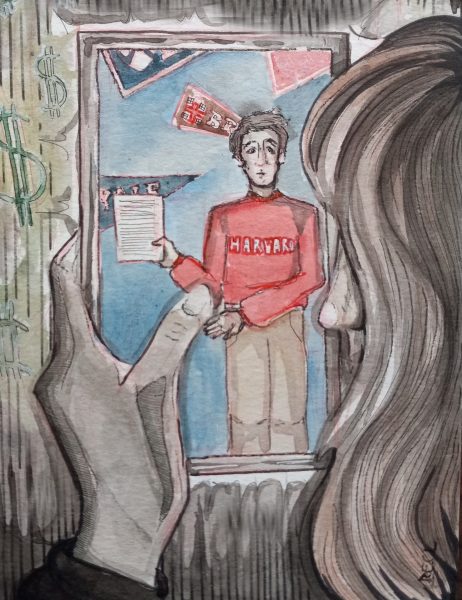‘We regret to inform you…’
Admission process to prestigious schools favors the wealthy and ultimately doesn’t matter much
May 1, 2018
“I failed that test; I’m so stupid. I’m never going to get into a good college.”
I can’t count how many times I’ve heard myself or a classmate beat themselves up, convinced that every bad grade or dropped extracurricular was a life-or-death mistake. But as seniors contemplate the schools they got into and those they didn’t in preparation for May 1, it’s important to remember this: college admissions is a tricky game. It is not at all the meritocracy it champions itself to be. Where you go to college has less bearing on your success in life than what you do once you’re actually there.
According to Malcolm Gladwell’s essay in The New Yorker, admissions into Harvard University were initially based solely on standardized test scores: as long as you qualified (and were a white male), you were in. This meant that greater amounts of “non-traditional” students—i.e. those who were not Protestant boarding school students—were attending the school, a fact the administration found unacceptable. So they revised admissions standards to require personal essays, an interview and a notification of legacy status (whether they had a parent who had attended Harvard). This admissions process became the standard process that nearly every school uses today. While it is accepted practice, the original purpose for it was to keep Jewish people out of Harvard. An Office of Civil Rights investigation in the 1980s found the comment, “short with big ears,” written on one applicant’s file.
And has it changed at all? Not really. A 2011 study, ironically out of Harvard, found that at 30 of the “highly-selective colleges,” a student whose parent attended the school as an undergraduate had a 45 percent higher chance of being accepted.
Like legacy students, rural and international students also have an unfair advantage. Many colleges will look upon applicants from rural areas more favorably, given that they are often saturated with urban, privately educated applicants. Last year, the number of international students enrolled in American colleges and universities increased 10 percent from the previous year. Colleges love international students. The more countries they can represent in their glossy brochures, the better. It also doesn’t hurt that international students often pay much higher tuitions.
College admissions have become a twisted, indecipherable game, where students from higher-income families hire college consultants to help them navigate unintuitive aspects of the process such as demonstrated interest and early decision.
To calculate demonstrated interest, a college records how many times you make a “touch” with the school, which can include emailing them, attending an information session or visiting the campus. The count supposedly indicates the applicant’s interest, but all it really does is add yet another part of the game that first-generation, lower-income students are less likely to know how to play or be able to afford.
Early decision, an admissions process where student can apply early but if admitted are obligated to attend the school, has also been criticized as showing preference to more privileged students, who have the security to commit to a school without knowledge of financial aid or scholarship options. For example, Vanderbilt University fills 54 percent of its class with students from early decision.
Schools also consider financial circumstances outright; they might not accept a student because they don’t have the ability to pay. A report from the National Association for College Admission Counseling found that about half of institutions said that an applicant’s “ability to pay” was of at least “some importance” in their admissions decisions. Some of the most selective schools admit more students from the top 1 percent of the income ladder than the bottom 60 percent.
The process is completely different for students with college-educated, middle-class parents: standardized test prep classes, writing coaches and college consultants are all unique amenities, as well as the encouragement and advice from their parents.
Still intimidated by those admission rates? To boost their rankings in publications like U.S. News, colleges will buy information from standardized-test companies and then encourage as many students as possible to apply, regardless of whether or not they think they actually have a chance to be accepted. The larger the applicant pool, the lower their admissions rate is, thus the higher their ranking will be.
Other factors have skewed the process even more. Because of the ease of using the Common App to complete multiple applications, approximately eight in 10 freshmen applied to at least three colleges in 2015, and the amount who applied to seven or more was up 17 percent from a decade ago.
And before you beat yourself up for not being perfect, keep this in mind: more than two-thirds of Stanford’s applicants with perfect scores didn’t get in, according to an article in the school’s alumni journal.
So why do we care so much about what such a small fraction of the world of higher education has to say? Schools representing only 20 percent of American higher education, those that accept fewer than half their applicants, accounted for around a third of all college applications in 2014. The top tier of U. S. college freshman said that reputation was “very important” to them in selecting a college in 2015—about 70 percent of them, according to UCLA’s Higher Education Research Institute. These schools are sought after like brand names.
A Harvard study found that teenagers today are three times more likely to agree than disagree with this statement: “My parents are prouder if I get good grades than if I’m a caring community member.” Furthermore, 80 percent say achievement or happiness is their top priority, while only 20 percent say caring for others is their top priority. And to what end? The proportion of teenagers who report that they frequently feel anxious or depressed has doubled in the last 30 years, according to the Nuffield Foundation.
Parents, for the most part, have good intentions. They want their kids to have the best life possible, which they think is at least in part dependent on the exclusivity and prestige of the college they attend. The increasing pressure on kids to succeed, however, only breeds negative results: high-achieving kids develop perfectionism and low self-esteem, while low-achieving kids conclude early that they will never succeed, so they might as well give up.
And what causes all this hand-wringing self doubt? The whims of one or two people on a particular day. James Cole, the former provost of Columbia University, told The Atlantic that admission often depends on “which person in the admissions committee reads your application; what their biases are, their presuppositions; whether they’ve had a bad egg-salad sandwich that day or read too many applications. These are all things that enter our decision-making process as human beings.”
The truth is, what college you go to doesn’t really matter. As long as you feel comfortable and empowered to push yourself to broaden your mind and try new experiences, you will get what you need out of the college experience.
Frank Bruin of The New York Times looked into the undergraduate alma maters of the CEOs of the top 10 Fortune 500 companies. The names might surprise you: University of Arkansas, University of Texas, UC Davis, University of Nebraska, Texas A&M, Kettering University, University of Kansas, University of Missouri, and Dartmouth College. Only one Ivy League school. The rest are mostly state schools.
Gallup and Purdue University conducted a study that found that the type of school a student attended, whether it was private or public, selective or less selective, mattered less to the success and happiness later in life than what they did while they were in school.
College admissions officers should limit the number of extracurriculars students can list on their application, de-emphasize standardized test scores and discourage high schoolers from enrolling in more than a handful of AP courses—at poorer high schools, they offer fewer or even no AP courses, and at wealthier schools a heavy load of them is found to increase sleep deprivation, anxiety and depression in teenagers. These steps will help to soothe the mania that compels teenagers to cram their schedule with activities and classes they don’t care at all about in the hopes of impressing colleges. College admissions should be exciting, not anxiety-inducing. Wherever you go, you will have all the tools you need to discover your passions and succeed, and that’s not something you can measure by an admissions rate.
















Bella Russo • May 4, 2018 at 8:09 pm
It’s nice to see not only an informative critique of the college admissions processes, but also some valid solutions that could solve those problems. The hopefully message of this story is also just as important, especially considering the amount of kids impacted by the flaws in this system.
Anissa Ryland • May 3, 2018 at 9:41 am
I didn’t know that was how the current admission process came to be what it is – interesting background. I hope all students will take this message to heart.